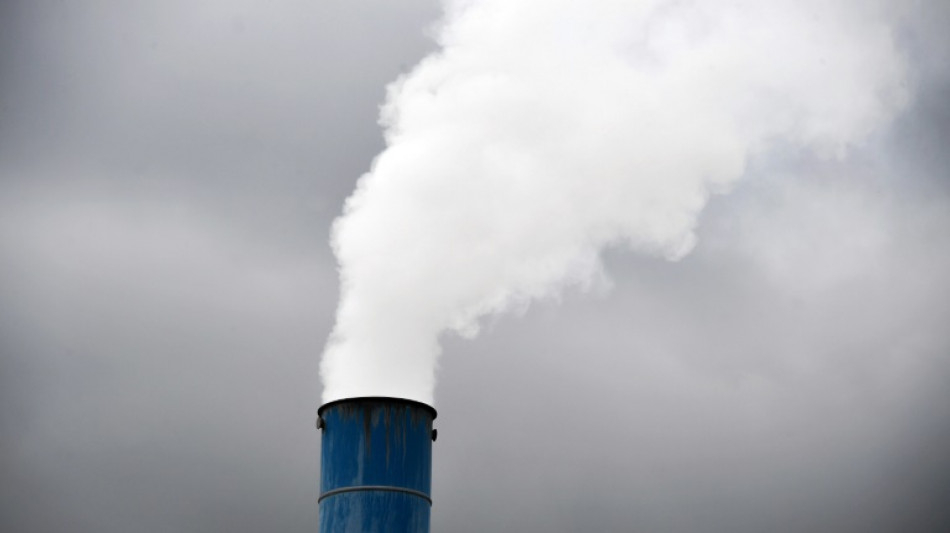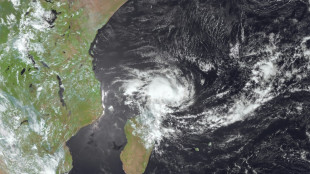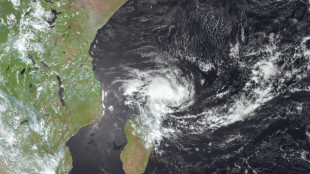
-
 US consumer inflation rises to 2.9 percent in December
US consumer inflation rises to 2.9 percent in December
-
Germany's Thiaw to miss Juve and Champions League clashes with hamstring injury: AC Milan

-
 France name Jegou, Auradou in Six Nations squad
France name Jegou, Auradou in Six Nations squad
-
Lategan back on top as Roma hands Ford first Dakar stage win in 10 years

-
 Mozambique's new president vows 'unity' as sworn in amid deadly protests
Mozambique's new president vows 'unity' as sworn in amid deadly protests
-
Russia PM meets Vietnam president, seeking deeper ties

-
 'New blood is coming': Mensik dumps Ruud out of Australian Open
'New blood is coming': Mensik dumps Ruud out of Australian Open
-
Syria sex abuse survivors need aid, says Nobel winner Mukwege

-
 Hammers boss Potter ready to make do and mend amid striker shortage
Hammers boss Potter ready to make do and mend amid striker shortage
-
Zverev cruises into Australian Open third round

-
 Ancelotti demands Real Madrid response after Clasico drubbing
Ancelotti demands Real Madrid response after Clasico drubbing
-
Serve better! Gauff outlines must-do for next Melbourne clash

-
 Benn and Eubank Jr boxing bout set to finally take place in London in April
Benn and Eubank Jr boxing bout set to finally take place in London in April
-
German economy shrinks again amid political crisis

-
 Spain hosted record 94 mn foreign tourists in 2024
Spain hosted record 94 mn foreign tourists in 2024
-
Thai PM says nearly fell for foreign leader phone scam

-
 European stocks climb as inflation takes centre stage
European stocks climb as inflation takes centre stage
-
Teenager Mensik sends sixth seed Ruud crashing out of Australian Open

-
 Russia strikes Ukraine energy sites in 'massive' barrage
Russia strikes Ukraine energy sites in 'massive' barrage
-
Dyche says Everton exit came at 'the right time'

-
 Australia mulls 'all options' after citizen reported killed by Russian forces
Australia mulls 'all options' after citizen reported killed by Russian forces
-
Djokovic creates slice of history as Zheng stunned in Melbourne

-
 Gauff overcomes wobble to roll into Australian Open last 32
Gauff overcomes wobble to roll into Australian Open last 32
-
BP nears deals for oil fields, curbs on gas flaring in Iraq

-
 Mozambique inaugurates new president after deadly post-election unrest
Mozambique inaugurates new president after deadly post-election unrest
-
Syrian activists work to avoid return to dictatorship

-
 Holy dips at India's giant Hindu festival come with challenge
Holy dips at India's giant Hindu festival come with challenge
-
Thousands to be evacuated after Mount Ibu eruption

-
 'Thrilled': Record-setting Djokovic trumps Federer on way to round three
'Thrilled': Record-setting Djokovic trumps Federer on way to round three
-
Alcaraz, Djokovic tip 'incredible' teenager Fonseca for the top

-
 Cocaine use nearly doubles in France: study
Cocaine use nearly doubles in France: study
-
Beijing 'firmly opposes' US ban on smart cars with Chinese tech

-
 Equities mixed as US inflation, China data loom
Equities mixed as US inflation, China data loom
-
UK inflation dips, easing some pressure on government

-
 India's triple naval launch shows 'self-reliance': Modi
India's triple naval launch shows 'self-reliance': Modi
-
Wallabies great Hooper set for comeback aged 33 with Japan move

-
 German bourse banks on Trump-fuelled crypto boom
German bourse banks on Trump-fuelled crypto boom
-
Record 36.8 million tourists visited Japan in 2024

-
 Trump's policies won't push up inflation, economic advisor says
Trump's policies won't push up inflation, economic advisor says
-
German far-right AfD takes aim at Bauhaus movement

-
 Djokovic makes slice of history as Zheng stunned in Melbourne
Djokovic makes slice of history as Zheng stunned in Melbourne
-
The journalists behind Sarkozy's Libya corruption woes

-
 SpaceX set for seventh test of Starship megarocket
SpaceX set for seventh test of Starship megarocket
-
Record-setting Djokovic trumps Federer on way to Melbourne third round

-
 Private US, Japanese lunar landers launch on single rocket
Private US, Japanese lunar landers launch on single rocket
-
Spanish youth ditch dating apps for 'real life' love

-
 Pakistan plot spin blitz as West Indies return after 19 years
Pakistan plot spin blitz as West Indies return after 19 years
-
Alcaraz tips 'incredible' Fonseca to be among world's best 'soon'

-
 Stunned Zheng blames lack of warm-up for early Melbourne exit
Stunned Zheng blames lack of warm-up for early Melbourne exit
-
Ominous Alcaraz 'really, really happy' with Australian Open form


Countries risk 'paying polluters' billions to regulate for climate: UN expert
An "explosion" of multibillion-dollar claims by fossil fuel and extractive firms through shadowy investment tribunals is blocking action on climate and nature, the UN Special Rapporteur for Human Rights and Environment has warned, with developing nations increasingly targeted.
After countries agreed this week at UN climate talks on a "transitioning away from fossil fuels", governments are likely to come under heightened pressure to boost regulation and reject further expansion of oil, gas and coal projects.
But that could leave them open to litigation under a secretive arbitration process called investor-State dispute settlement (ISDS), according to UN rights expert David Boyd, who has called it a "major obstacle" to environmental action.
"When governments bring in these stronger laws and policies, they're ending up paying millions -- and sometimes billions -- of dollars in compensation," Boyd told AFP.
Denmark, France and New Zealand have all backed off from stronger regulation on fossil fuel exploration because of ISDS fears, he said.
In a report called "Paying Polluters", presented to the UN General Assembly earlier this year, Boyd warned that the number of claims -- and the size of the payouts -- were soaring.
"The explosion of ISDS claims in recent years, and the threat of such claims, is led by fossil fuel, mining and other extractive industry corporations," Boyd said in his report.
ISDS cases targeting actions to protect the environment rose from 12 initiated before 2000, to 37 from 2000 to 2010, and 126 between 2011 and 2021, it said, adding fossil fuel and mining industries have won over $100 billion in awards.
That could rise substantially, as "sunset clauses" mean even if a state pulls out of a treaty it could still face litigation for some two decades.
- 'Hypocrisy'-
ISDS mechanisms built into thousands of international treaties have roots in the global reconfiguration after World War Two, as investors based often in former colonial powers sought to protect assets in newly-independent countries.
Lukas Schaugg, an international law analyst with the International Institute for Sustainable Development, said the tribunals had historically operated with a "lack of public scrutiny".
"People are increasingly talking about the duty of states to regulate with regard to climate," said Schaugg, who used to work at the International Chamber of Commerce's arbitration court.
Now, "the clash with the investment treaty regime is increasingly visible", he said.
The United Nations Conference on Trade and Development says ISDS poses a particular challenge for the energy transition.
In an August report, UNCTAD said of 1,257 publicly-known ISDS claims made by early 2023, 15 percent were initiated by fossil fuel investors.
Even renewable companies have filed substantial claims, as countries change investment incentives.
The Energy Charter Treaty is the most frequently-invoked international investment agreement in these claims.
It "can amplify existing burdens on countries that are trying to shift from traditional fossil fuel projects to renewable energies", UNCTAD said.
Several wealthy nations have moved to pull out of the ECT, including Germany, France and the Netherlands, while the European Parliament has called for withdrawal of the entire EU.
Boyd said even as richer nations reduce their exposure, investors continue to use their territory to target poorer nations.
"It's absolutely gross hypocrisy, it's unjust and it's definitely unequal," he said, adding that "jurisdiction shopping" also allows foreign companies to open offices in treaty countries to launch claims.
According to UNCTAD, 65 percent of cases in 2022 were brought by investors in richer nations -- and 65 percent of cases were against developing countries.
- 'Dustbin of history' -
Examples of claims include two Australian mining corporations seeking nearly $37 billion from the Republic of Congo -- more than twice its 2022 gross domestic product.
"It's obvious that there's no way on earth the Republic of Congo could pay that kind of compensation, if they were unsuccessful in these claims," Boyd told AFP.
Often, he said, "governments just capitulate".
Last year, Pakistan agreed an out-of-court settlement with a foreign firm, which waived penalties that had ballooned to $11 billion in exchange for the reopening of an open-pit copper mine.
It was seen as the only solution for the debt-stricken country after a World Bank arbitration tribunal imposed a $5.8 billion penalty in 2019.
The Tethyan Copper company told the tribunal it had spent over $240 million on the mine.
Boyd said the case illustrates inconsistencies in tribunal awards.
Payouts are sometimes based on investors' actual spending on a project, but at other times use a method estimating future earnings.
Boyd called for the investment treaty system to be reimagined to align with rights and environmental priorities -- and for ISDS to be "relegated to the dustbin of history".
"We've known there's been a climate crisis for 30 years (but) we have companies operating coal fired power plants, saying: 'We had a legitimate expectation we'd be able to continue burning coal forever'," he said.
"Those arguments are being accepted by these arbitration tribunals."
D.Kaufman--AMWN



